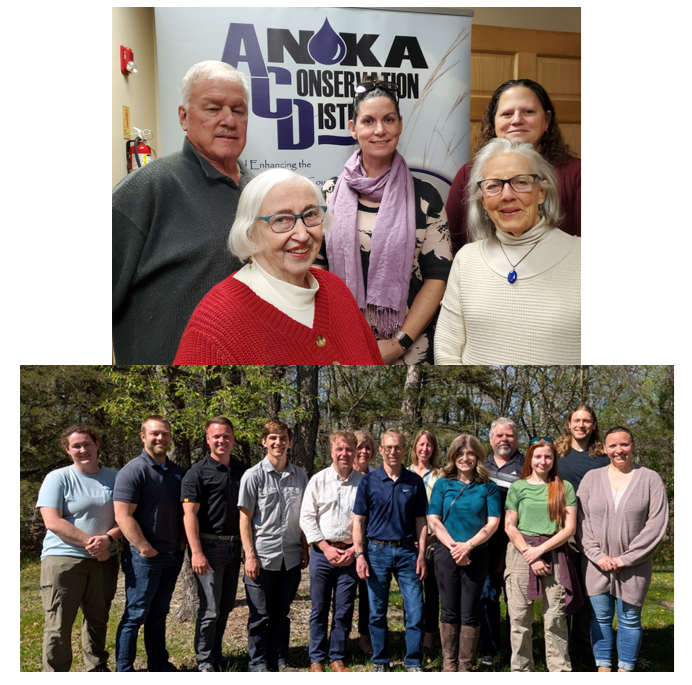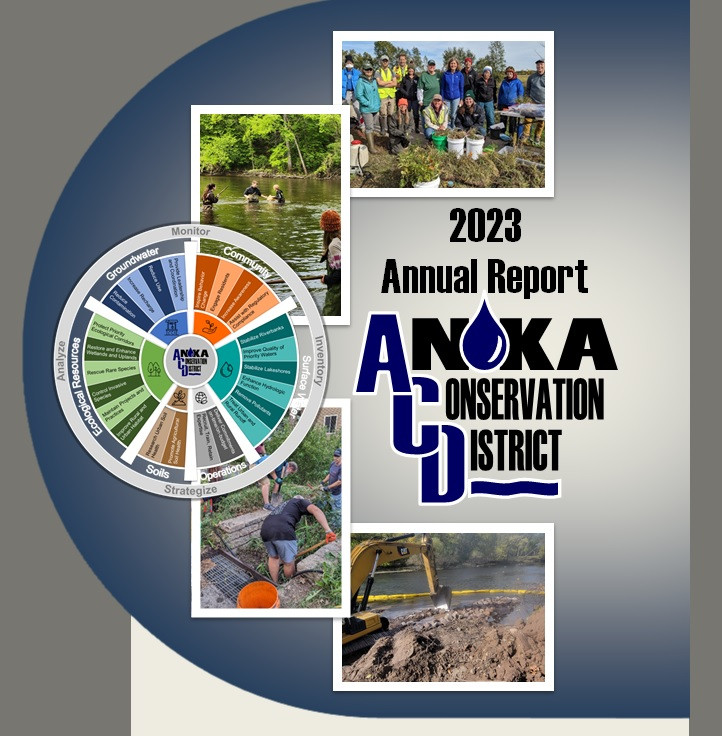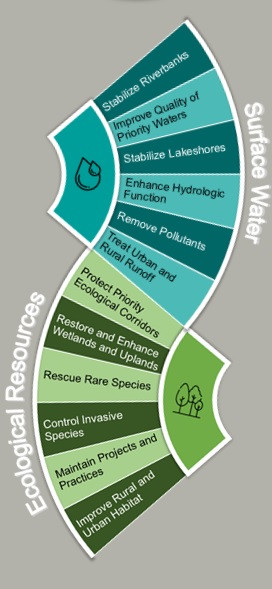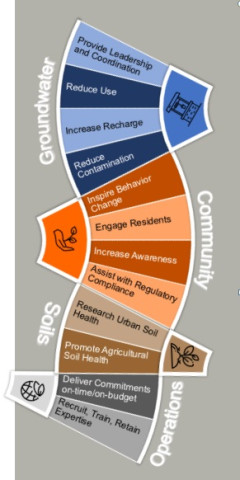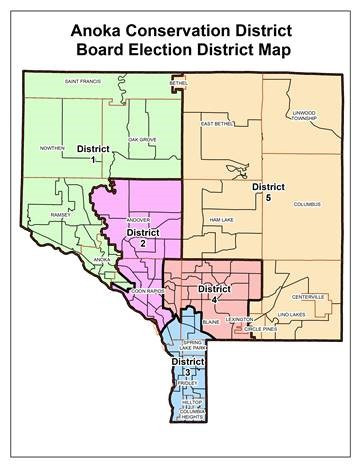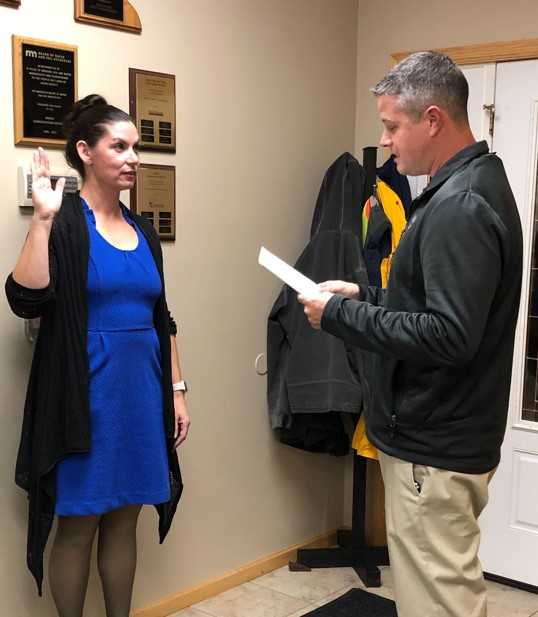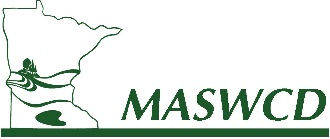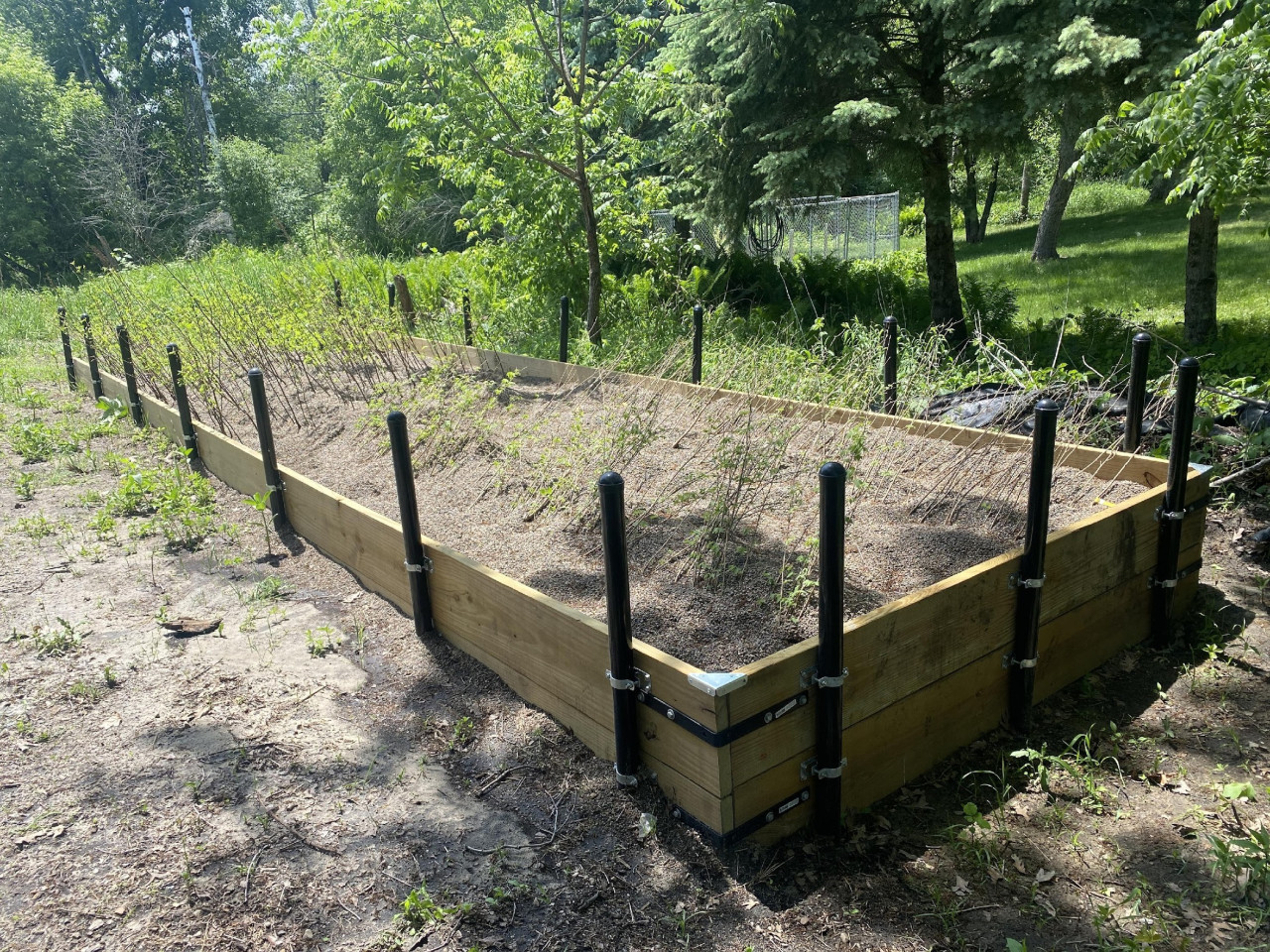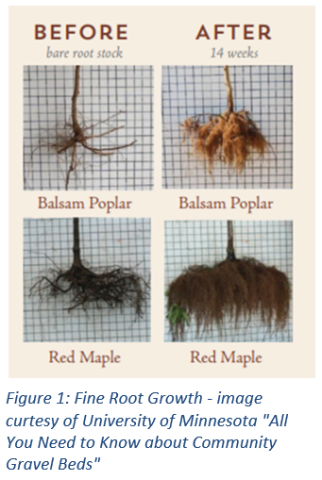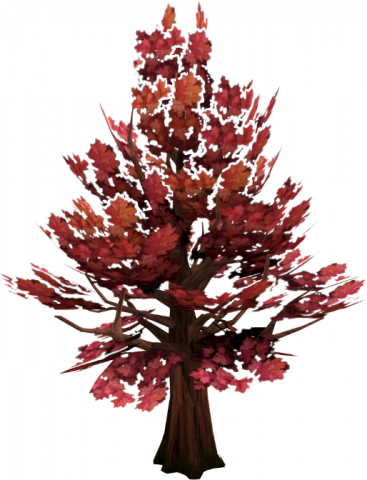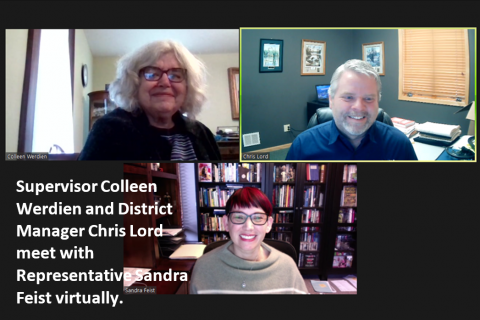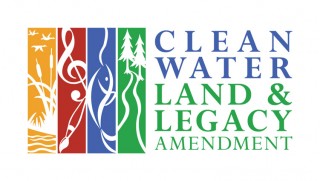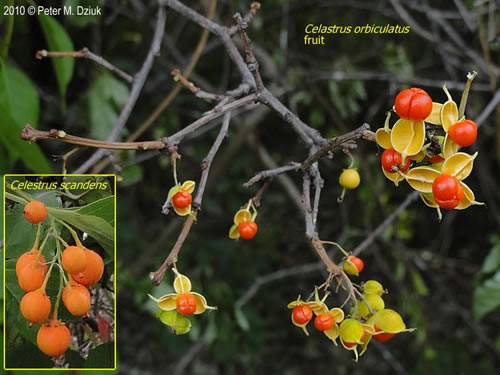ACD identified several keystone endeavors for each of the foundational natural resources: Surface Water, Ecological Resources, Groundwater, and Soils as well as Community and Operation. We also recognize the foundational knowledge provided by monitoring, inventory, analysis and planning. As we make progress on these endeavors, we'll have a positive impact on the quality of life in Anoka County. Listed below are achievements from 2023. Each year, it's important to take stock in how well we progressed in the prior year.
Foundational Knowledge
Monitor - 123 monitoring sites including lakes, rivers, wetlands, groundwater, and precipitation involving quantity, quality and biology.
Inventory - Photo inventory of Rum & Mississippi rivers, Oak Glen Creek, and Martin, Linwood, and Coon Lakes. Aquatic plant inventory of Lake George and Highland Lake. Restorable wetlands and buffer law compliance inventories.
Analyze - Completed Centerville Lake Stormwater Retrofit Analysis (SRA). Advanced Rum and Mississippi SRAs. Completed Subwatershed Analysis (SWA) for Ford Brook and Rum River drainage areas.
Strategize - Annual work plans for ACD, local WMOs, Rum and Lower St. Croix watersheds. Participate in regional planning initiatives.
Surface Water
Stabilize Riverbanks - 3,041 ft. of Rum Riverbank.
Improve Quality of Priority Waters - Martin and Typo Lakes improving. Projects on Lake George, Golden Lake, Mississippi and Rum Rivers.
Stabilize Lakeshores - 180 linear ft. of lakeshore on George and Golden Lakes.
Enhance Hydrologic Function - Pond modification treating 86.8 acres for water quality and stormwater attenuation.
Remove Pollutants - 123 lbs Total Phosphorus and 117 tons Total Suspended Solids reduced.
Treat Urban and Rural Runoff - Enhancing treatment of 97 acres of urban runoff.
Ecological Resources
Protect Priority Ecological Corridors - Two RIM conservation easements totaling 52.4 acres including 3,750 ft. of Rum River frontage. Assumed management of 126 acre wetland bank.
Restore and Enhance Wetlands and Uplands - 50 acres-Prairie, 29 acres-oak savanna & woodland, 29 acres-wetland, 10,000 ft²-riparian habitat, and 2,000 ft²-lakeshore habitat.
Rescue Rare Species - 900 rare plants rescued and planted into 5 protected sites.
Control Invasive Species - 41 acres-buckthorn, 2.6 acres-non-native Phragmites, 5 acres-wild parsnip, 1 site-round-leaf bittersweet, 1 site-golden creeper, 10 sites-knotweed, 1 site-tansey, 0.5 acres-spotted knapweed.
Maintain Projects and Practices - 74 sites inspected.
Improve Rural and Urban Habitat - 12,015 ft². of riparian and shoreline buffers.
Groundwater
Provide Leadership and Coordination - Serve on metro groundwater sustainability workgroup. Pursue funding for Groundwater Specialist. Pass MASWCD resolution for groundwater conservation funding from DNR user fees.
Reduce Use - Comment on DNR water appropriation permits to reduce waste.
Reduce Contamination - 6 failing septic system fixed, 15 wells sealed.
Community
Inspire Behavior Change - 71 projects installed.
Engage Residents - 167 site consultations, 38 project designs, 5 volunteer events, 354 tree sale customers.
Increase Awareness - Completed Our Riverbank Connection video and accompanying online quiz, 26,507 views of Our Connection video series, presentations to 400+ participants on a variety of topics, workshops, monthly snapshot, quarterly newsletter, active blog, and social media.
Assist with Regulatory Compliance - 99.9% buffer law compliance, Wetland Conservation Act guidance.
Soils
Promote Agricultural Soil Health - Cost share funding promotion, 1 project-10 acres.
Operations
Deliver Commitments On Time and On Budget - Closed out 8 grants.
Recruit, Train, Retain Expertise - Added P.E. licensure, no resignations.
For more information on ACD's 2023 activities check out the full 2023 ACD Annual Report or contact Chris Lord, District Manager, at
Minnesota's natural resources play an important role in the state's economy and high quality of life. Protecting and managing these precious natural resources is a large undertaking and takes continuous effort at the state and local level. Soil & Water Conservation Districts (SWCD's) throughout the state are governed by a five member board of supervisors elected by the citizens of the county. The SWCD board is responsible for policy development, annual plans, budgets, and more. The Anoka Conservation District will have three supervisor positions on the November 2024 ballot. These positions are four-year terms and require between 1 to 3 monthly meetings and receive modest compensation per meeting.
The following districts in Anoka County will be up for election:
District 1 - Anoka, part of Coon Rapids, Nowthen, Oak Grove, Ramsey, St. Francis
District 4 - Portions of Blaine and Coon Rapids, all of Lexington
District 5 - Bethel, Centerville, Circle Pines, Columbus, East Bethel, Ham Lake, Lino Lakes, Linwood Township
Filing is easy but must happen between May 21 and June 4. Just go down to the County Government Center in Anoka during that time and they'll tell you what to do.
For more information read the frequently asked Questions or contact Kathy Berkness, Office Administrator, at
The elected Board of ACD is moving forward with legislation to have the ability to levy property taxes for residents of Anoka County. With the levy limits included in the bill (HF3701) and ACD's other revenue streams, the anticipated levy increase for the average single family home in 2025 through 2029 is around $0.67 per year. Why bother pursuing legislation for such a small levy? That's a long story, but here's the gist of it.
- ACD has been around since 1946 serving the public by providing financial and technical assistance to private landowners who want to be good stewards of our lakes, stream, wetlands, drinking water, wildlife, etc.
- ACD submits a budget to Anoka County to request funding to support our mission. The County has the option to fund all, some or none of the request.
- ACD's requests to the County compete for limited funding against transportation, public safety, social services, economic development, and parks and recreation.
- For 20 years, when population growth and inflation alone grew Anoka County's budget by 83%, ACD's allocation grew by 8.4%.
"So what you're saying is that if ACD gets its way, a family of four in Anoka County will have to give up one fancy cup of coffee every four years for cleaner lakes and rivers, better fishing, improved habitat for wildlife, and safer drinking water?" Well, when you put it that way…
For more information about ACD's pursuit for levy authority contact Chris Lord, District Manager, at
ACD has a new Board Member for District IV. Kate Luthner was officially sworn in on November 20, at the ACD office. Kate is a 20-year resident of Minnesota and lives with her husband and three kids in Columbus. She enjoys hiking, biking, gardening, and reading and painting for those cold winter months. Kate previously served on the Forest Lake Area School Board and volunteers with several other local organizations. Kate has a BA from Cabrini University and an MBA from the University of St Thomas. She is excited to learn more about the role of SWCD's and how ACD is working to preserve and enhance the world we all share.
This legislative session, the Minnesota Legislature passed Minnesota Statute 477A.23, subd. 4(b), providing funding to soil and water conservation districts (SWCDs) throughout the state. While this isn't new money, the funding comes from a different source that will make it more reliable and provide local flexibility.
For the last eight years, SWCDs have received funding through the Clean Water Fund of the Clean Water, Land and Legacy Amendment which required legislative action every two years. On average, Anoka Conservation District (ACD) received $125K/year with 2023 being $137K. Unlike most grants, this funding could be used for any project or program aimed at improving water quality. ACD could quickly tap into these funds to complete many small but critical efforts such as:
- photo inventories of lakeshore and riverbank erosion,
- development of public outreach materials to promote conservation programs,
- hosting events,
- website enhancements like project mapping, and dashboards,
- equipment and technology purchases, and
- small project cost share.
Where the previous funding fell short was that it couldn't be used for projects outside the scope of water quality, making projects such as habitat improvement, water conservation, and general public outreach and engagement ineligible. The new funds will replace Clean Water Funds and are distributed directly from the state through the Department of Revenue to SWCDs, cutting out mid-level agency involvement and reducing red tape. Now that these funds aren't restricted solely to water quality, SWCD's can use the funds where they are needed to properly address local priorities.
We are excited that for two years ACD will receive a bit more than past years at $179K. This will go down to normal thereafter.
For more information contact Chris Lord,
Gravel beds are designed to store bare-root trees and shrubs while enhancing root development. Gravel beds can be crafted from anything that can contain 18-inches of pea gravel, or can even be made from nothing more then piles of pea gravel.
Plants placed in gravel beds become stressed and put energy into creating fine root systems to find nutrients and water. After a few months, the well-developed root systems increase survival rates after planting by several fold. Gravel allows for root growth while making the plants easy to remove. Gravel also doesn't degrade and inhibits the growth of pathogens and weeds.
Bare-root trees and shrubs are easier to handle, cheaper to purchase, and come in greater varieties. Since bare-root plants are often only available in the early spring, the gravel bed can store bare-root plants for projects that have a summer or fall timeline. Plants with healthier root systems and higher survival rates are particularly important on projects where watering newly planted trees and shrubs is impractical.
ACD's gravel bed was envisioned and designed by Ethan Cypull, a Minnesota GreenCorps member that is currently stationed at ACD. Construction of the gravel bed was completed by Ethan and other ACD staff.
For more information contact Ethan Cypull,
ACD is going to start taking tree orders in mid-October for an end of April pick up. The trees and shrubs are sold as bare root seedlings or transplants ranging from 12" to 18" in height. They may be purchased in bundles of ten for $20 or twenty-five for $40, not including tax. Native prairie seed and tree aides are also available.
You do not need to be an Anoka County Resident to order.
Call 763-434-2030 x 100 or email
Over the course of several days in March and April, ACD staff and supervisors held virtual meetings with 15 of the 17 legislators that cover Anoka County. Each meeting flows a little differently depending on the natural resource issues happening in their districts and how familiar they are with ACD's programs and services.
As much as we enjoy connecting with our state legislators and hearing about the endeavors they are championing, we were on a mission. HF3719 and SF3913 are working their way through the Legislature to provide more stable funding to Soil and Water Conservation Districts, of which ACD is one of 90 statewide. It was important to us to garner support for this bill, which helps address a long-standing challenge SWCDs have had securing sufficient and stable funding for base operations.
ACD is also initiating legislative discussions to secure levy authority for Anoka Conservation District. Anoka Conservation District Manager, Chris Lord is working with the Revisor's Office to draft bill language to be refined throughout the summer months with input from legislators so it can be introduced next session. With strict limits in place (less than $2.75 per person per year maximum) to guard against run-away spending, local levy authority would provide ACD's elected board of Supervisors much deserved autonomy and stabilize ACD's programs and services. ACD often builds programs with grant funds only to dismantle them when the grant runs out. Repeating this cycle without end is highly inefficient. "Less than 10% of ACD's budget comes from a stable local levy. To effectively operate an agency with such an unstable financial foundation is not reasonable in the long-term" said Lord.
ACD received funding from BWSR to continue the Anoka Cooperative Weed Management Area program and received two sources of MDA funding for Anoka County invasive species control and for Metro-wide non-native Phragmites treatment.
The Anoka Cooperative Weed Management Area Program currently consists of 27 Partners who have identified priority invasive species of concern, locations and activities in Anoka County. ACD received the maximum funding of $15,000 to be utilized in three years. Renewal/BWSR Request for Proposals are offered every two years. Current BWSR funds will support:
- mapping and monitoring priority invasive species on EDDMaps,
- surveys in select high quality habitats,
- implementation of biocontrol release,
- monitoring past treatment,
- training a new partner, Anoka County Highway staff on invasive species identification and treatment, including wild parsnip sites identified on Anoka Highway ROW,
- organizing and creating outreach material and expanding the ACWMA website to provide a central location for ACWMA resources,
- provide outreach and engagement with City Staff, residents, and volunteers,
- and, provide technical and financial resources for invasive species cost share program for priority invasive species and priority locations.
ACD received the maximum funding from MDA Level 1, $10,000, to be spent in 2020. These funds will increase the capacity of the ACWMA efforts and specifically support:
- Invasive species trainings and volunteer engagement in invasive species control in Anoka County, including a training to Anoka County Master Gardeners in April 2020.
- Mapping and monitoring priority invasive species and surveys in high quality habitats.
- Release knapweed root weevil (Cyphocleonus achates) and knapweed flower weevils (Larinus minutus obtusus) biocontrol at two sites.
- Provide training to Anoka County Highway to identify and control priority invasive species, starting with wild parsnip by June 2020.
- Treat all known populations of wild parsnip in Anoka County by July 2020.
- Follow up treatment of golden creeper with digging out roots and June 2020 and herbicide application of any remaining plants by September 2020.
- Conduct a land management and invasive speices workshop to City of Blaine residents in September 2020. By mid-November 2020, provide technical and financial support for buckthorn treatment to landowners adjacent to the Blaine Wetland Sancturary, treating 12 acres of buckthorn. I'm collaborating with Rebecca Haug/City of Blaine, Beth Carreno/RCWD and Metro Blooms.
ACD received $49,705 from MDA Level 2 to be spent over two years to map, treat, and monitor non-native Phragmites in the Metro. Metro County Partners will continue mapping and will obtain permission from landowners to treat with herbicide and mowing. ACD will coordinate monitoring following MN DNR protocols, will hire a contractor for treatment, and lead native planting/restoration at Sunrise Lake which was previously treated.
The Lessard-Sams Outdoor Heritage Council is recommending $952,000 from the Outdoor Heritage Fund for ACD to stabilize eroding Rum Riverbanks utilizing habitat-building, bioengineering approaches over the next three years. Bioengineering techniques stabilize and armor eroding riverbanks in a way that both protects the bank from further erosion and provides traversable habitat for wildlife. These techniques rely on using natural materials such as tree trunks and root wads, in-stream rock weirs, native plantings and tree staking, gradual slope grading, and minimal hard armoring where necessary. Current erosion along streambanks, as well as traditional armoring techniques like riprap, result in a wall or barrier to wildlife. The bioengineering techniques that will be employed by ACD in the Rum River will eliminate those barriers and provide additional habitat for all kinds of wildlife.
ACD has identified over twenty eroding banks along the Rum River in Anoka County that it will be seeking to address with these funds. It is anticipated that four to eight sites will be stabilized with the $952,000 from the LSOHC and an additional $236,000 in local funds from Anoka County and the Upper and Lower Rum River Watershed Management Organizations. Anoka County has pledged $442,000 in Rum River stabilization matching funds over the next five years. The remaining funds will be used as match for future grant applications.
The Lessard-Sams Outdoor Heritage Council has made the funding recommendation to the Minnesota Legislature, who will draft final bill language during the 2020 legislative session. ACD will begin reaching out to landowners with identified eroding banks suitable for these stabilization techniques after the funding is finalized.
Example photo of an eroding Rum Riverbank stabilized with bioengineering techniques. This project was the result of the continuing partnership between ACD and Anoka County Parks.
